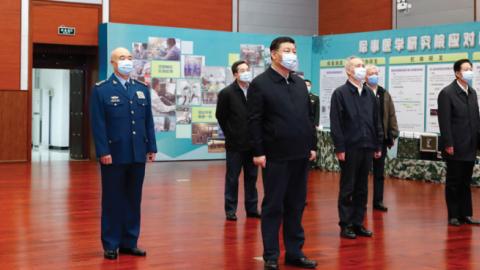The U.S. government is rightly focused on emergency domestic measures to prevent the spread of coronavirus and mitigate its economic consequences. But it should also be advancing supplementary actions that enable it and other governments around the world to confront the crisis more effectively.
Prominent among these must be sustaining efforts to crack down on transnational corruption. As the Ebola epidemic and other public health crises demonstrated, new opportunities for bribery and embezzlement can skew the priorities of officials entrusted with safeguarding public health and empty state coffers of vital resources precisely when they are needed most. Kleptocrats will be rubbing their greasy palms at the prospect of trillions of dollars being hurriedly deployed to combat the coronavirus pandemic.
The Chinese Communist Party’s (CCP) aggressive push to conceal its responsibility for the outbreak, falsely shift blame to the United States, and assert global leadership in responding to the crisis adds urgency to the fight against authoritarian kleptocracy. After all, it now seems fairly certain that it was the paranoid failings of a political system compromised by corruption that allowed the coronavirus to spread in the first place.
Chinese health professionals’ expertise and medical supplies produced by Chinese manufacturers are of course needed and welcomed by the rest of the world. But as communist officials reportedly plot a new “Health Silk Road,” in the longer term, we can expect to see a global corruption bonanza in the vein of the Belt and Road Initiative characterized by debt diplomacy, opaque deals, and shoddy or undelivered projects.
As the U.S. administration responds to the crisis and Congress considers a trillion dollar action package, here are five things America can do to ensure that authoritarian corruption doesn’t undermine the global fight against coronavirus.
1) Sanction senior foreign officials who cover up vital public health data: A study indicates that had the CCP acted three weeks earlier than it did, the number of coronavirus cases could have been reduced by 95 percent and its spread could have been contained. Instead, communist officials reportedly spent that critical window destroying lab samples and threatening whistleblower doctors like Li Wenliang.
Millions of lives now depend on open access to reliable coronavirus data. But authoritarian regimes worldwide are following the CCP’s example and scrambling to suppress this information.
The United States has a Global Magnitsky Act to punish and deter human rights abuses and corruption. We now need a Li Wenliang Act to provide authority for designating senior foreign officials who deliberately conceal or distort vital public health data. This would name and shame those responsible for the outbreak while hopefully deterring others from similarly reckless behavior.
2) Confiscate and repurpose stolen funds to fight coronavirus: As the pandemic threatens to overwhelm healthcare systems worldwide, populations whose public funds have been plundered by their own leaders are especially vulnerable.
No other country pursues the proceeds of foreign corruption with the tenacity and resources of the United States, notably through its interagency Kleptocracy Asset Recovery Initiative.
Insofar as legally possible, the U.S. government should now release funds confiscated from corrupt foreign officials and repurpose them for the fight against coronavirus in countries where the money was originally stolen. Whether such funds can make a significant difference will vary, but if nothing else the gesture will be warmly welcomed by the victims of kleptocracy.
3) Expedite legislation to fight foreign corruption: The United States finds both its anti-money laundering defenses and ability to fight kleptocracy overseas increasingly outdated, precisely as corruption threatens to undermine an effective global response to coronavirus. As luck would have it, there is an impressive bipartisan anti-kleptocracy package currently sitting in Congress just waiting to be passed. Here are a few examples:
The **ILLICIT CASH Act** is a long-overdue update to America’s creaking anti-money laundering defenses. It would address the scandal whereby U.S. shell companies are used more than those of any other country in money laundering schemes; boost resources for the Treasury Department’s beleaguered financial intelligence unit; and commission a much-needed study on the nature and scale of Chinese money laundering.
The **Countering Russian and Other Overseas Kleptocracy (CROOK) Act** would fundamentally upgrade America’s ability to combat illicit financial networks controlled by hostile authoritarian rivals, and create a rapid-response fund to support vulnerable countries at historic moments of opportunity.
The **Foreign Extortion Prevention Act** would criminalize the solicitation of bribes by foreign officials, protecting American businesses operating overseas from unfair competition by Chinese state-backed firms.
The **Justice for Victims of Kleptocracy Act** would require the Department of Justice to list by country how much money it has confiscated from foreign officials, increasing public pressure on corrupt regimes.
These and various other bills involve relatively modest reforms but would significantly upgrade America’s ability to fight illicit finance at a critical time.
4) Support the private sector: Financial institutions are the first line of defense when it comes to detecting dirty money. But with the onset of a new economic downturn, compliance departments will be under pressure to cut corners as businesses downsize or divert funds elsewhere. As the pandemic reshapes the global economy, new methods and forms of threat finance will undoubtedly emerge. Now is the time for the U.S. government to address longstanding complaints that it tasks the private sector with policing the financial system without providing adequate support. To its credit, the Treasury Department has made an excellent start by asking financial institutions to communicate how the coronavirus will affect their compliance operations.
5) Step up efforts to combat the illegal wildlife trade: The coronavirus is believed to have originated in a market in the city of Wuhan, a major hub of China’s booming legal and illegal wildlife trades. The illegal wildlife trade is obviously not subject to health and safety checks, heightening the risk of transmission to humans. But the legal wildlife trade is no better in countries like China where inspectors and other public officials can be bribed to look the other way.
China is the undisputed epicenter of the $23 billion global illegal wildlife trade. This has not only helped to destroy 60 percent of the world’s wildlife since the 1970s, but may well now be the source of a pandemic that threatens millions of human lives. For too long, policymakers have treated the illegal wildlife trade as a conservation issue rather than a global public health threat. The U.S. government should now place this dangerous practice on the same footing as terrorism financing, drug trafficking, transnational organized crime, and other forms of threat finance.
None of these measures will stop coronavirus, but they can help ensure that increased public health expenditure finds its way to researchers and patients rather than kleptocrats. They also pose a direct threat to the authoritarian culture of secrecy and corruption--embodied by the Chinese Communist Party--which is undermining our ability to plan and respond to the pandemic in a unified and effective manner.



















